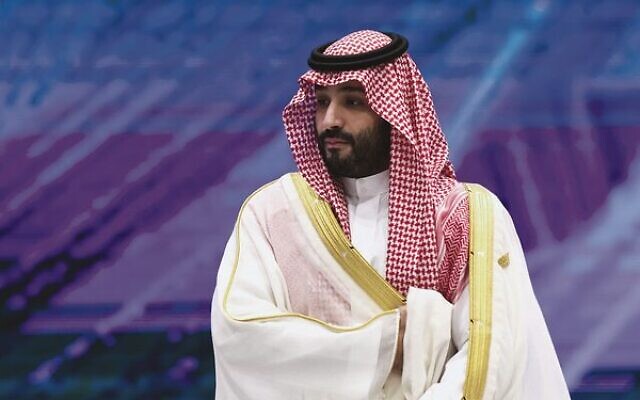US delegation to discuss normalisation
Saudi Arabia is prepared to forgo its long-maintained public stance against normalising with Israel in the absence of a two-state solution to the Israeli–Palestinian conflict.
(Times of Israel) – A delegation of top American officials was slated to travel to Riyadh this week to meet with Saudi counterparts in order to discuss a potential normalisation agreement between the Gulf kingdom and Israel, a US official and a Palestinian official told The Times of Israel.
The visit by White House Middle East coordinator Brett McGurk and Assistant Secretary of State for Near Eastern Affairs Barbara Leaf comes just over a month after US National Security Adviser Jake Sullivan visited Saudi Arabia with the same objective, pointing to Washington’s continued determination to broker an elusive deal. US Secretary of State Antony Blinken also visited Riyadh on the same mission in June.
McGurk and Leaf’s visit overlapped with that of a Palestinian delegation led by Palestine Liberation Organisation executive committee secretary-general Hussein al-Sheikh, who was in Riyadh to discuss what Ramallah is hoping to obtain from a Saudi-Israeli normalisation deal, the two officials said.
A White House spokesperson declined a request for comment while a State Department spokesperson said they had nothing to announce. A spokesman for the Saudi embassy in Washington did not respond to a request for comment.
Saudi Arabia is prepared to forgo its long-maintained public stance against normalising with Israel in the absence of a two-state solution to the Israeli–Palestinian conflict, but Riyadh is still not expected to agree to a deal with Jerusalem that does not include a significant advancement toward Palestinian sovereignty, according to officials familiar with the matter.
Last week, three officials told The Times of Israel that the Palestinian Authority is seeking “irreversible” steps that will advance its bid for statehood in the context of negotiations for a normalisation agreement between Israel and Saudi Arabia.
The steps proposed have included US backing for recognition of Palestinian statehood at the United Nations, the US reopening its consulate in Jerusalem that historically served Palestinians, the scrapping of congressional legislation characterising the PA as a terror organisation, the transfer of West Bank territory from Israeli to Palestinian control, and the razing of illegal outposts in the West Bank.
The steps would be major victories for the PA, which has enjoyed few diplomatic achievements in recent years. However, they are a far cry from the more far-reaching demands Ramallah has long raised, highlighting its diminished political stature at home and abroad.
Sheikh discussed the measures with Leaf, the US assistant secretary for Near Eastern affairs, during a meeting last week and received a largely chilly response, according to a Palestinian official.
Major gestures to the Palestinians are almost certain to be opposed by some in Netanyahu’s hardline government. Finance Minister Bezalel Smotrich said last week that the idea that Israel will make concessions to the Palestinians as part of a normalisation deal is a “fiction”.
While a deal is expected to include a Palestinian component, the bulk of Saudi demands are directed at the US, and those have been the focus on the negotiations thus far between the Biden administration and Saudi Crown Prince Mohammed bin Salman.
Riyadh has been seeking a NATO-like mutual security treaty that would obligate the US to come to Saudi Arabia’s defence if the latter is attacked, a US-backed civilian nuclear program in Saudi Arabia, and the ability to purchase more advanced weaponry from Washington.
In exchange, the US is looking for Riyadh to significantly roll back its economic and military ties with China and Russia and bolster the truce that ended the civil war in Yemen.


comments